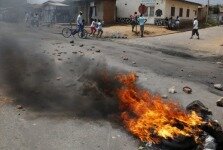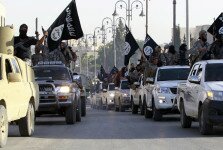Three protesters and one suspected member of ruling party’s youth wing killed in ongoing unrest over president’s bid for third term

Soldiers disperse a crowd in Bujumbura, Burundi
A man was burned to death by protesters on the streets of Burundi’s capital, witnesses said – one of at least four people to be killed amid ongoing demonstrations against the president’s bid for a third term in power.
The man, believed to be a member of the ruling CNDD-FDD party’s youth wing, Imbonerakure, died after being set on fire in what appeared to be a revenge attack. “They put tyres around his neck and then burned him,” a witness in the Nyakabiga district of Bujumbura told Reuters.
Gervais Abayeho, a spokesman for the president, Pierre Nkurunziza, said he condemned the killing “in the strongest terms possible”. In an apparent reference to the 1993-2006 civil war in the tiny east African nation, Abayeho told Reuters: “We don’t want the situation to degenerate and take us back to those years when people were killed on the streets in broad daylight.”
Three anti-Nkurunziza protesters were killed on Thursday, according to witnesses, including one shot in the head and another hit by a grenade blast blamed on CNDD-FDD supporters. One suspected Imbonerakure member narrowly survived being lynched before being rescued by the army, and a second was left seriously wounded after being attacked by protesters, Agence France-Presse reported.
In all, 17 people have died in protests that have taken place almost daily since Nkurunziza announced late last month that he would seek to extend his 10-year rule. Hundreds of people have been arrested and almost 40,000 have fled the country. The government has characterised the protesters as terrorists leading an “insurrectional movement”.
The standoff is being watched closely across Africa. Last year a popular uprising forced Burkina Faso’s president, Blaise Compaoré, to abandon plans to amend the constitution so he could extend his 27-year rule. There is speculation that the presidents of the Democratic Republic of the Congo and Rwanda, both neighbours of Burundi, will seek similar changes allowing them to run for third terms.
Advertisement
Elections due in Burundi on 26 June are now in serious doubt. Nkosazana Dlamini-Zuma, chair of the African Union commission, told the Chinese broadcaster CCTV: “The environment is not conducive for an election. You can’t be going into a country meeting refugees leaving, and saying: ‘We are going to observe the elections.’ As things stand, I don’t even see how elections can take place under these conditions.”
A similar sentiment is growing in Bujumbura. Augustin Ndikuriyo, a tour guide, said: “How can you think of an election when people are not working and are staying in their homes? If they are not protesting, they are in their homes. Economically, the country is dying.”
He added: “A small group of big men is trying to control the population. The president should have stood down before. He’s made everyone angry.”
Nkurunziza, a former rebel leader from the Hutu majority who has been in power since 2005, has faced intense international pressure to withdraw from the polls. Opposition parties and civil society groups say his nomination by the CNDD-FDD goes against both the constitution, which limits a president to two terms in office, and the accords that ended the civil war between the Hutus and the Tutsi minority.
But the constitutional court found in favour of Nkurunziza on Tuesday, saying his first presidential term did not count as he was elected by parliament, not directly by the people. The court’s vice-president had earlier fled the country after refusing to sign the judgment and claiming that judges had been subjected to death threats.
Dlamini-Zuma said: “Other than the Burundi court, all interpretation that we get about the constitution is that … really there shouldn’t be a third term.”
In a televised speech on Wednesday, Nkurunziza said holding an election was “the only solution” to the crisis and promised he would not run for a fourth term. He said all those arrested would be released if the protests stopped immediately.
The main opposition leader Agathon Rwasa demanded that the vote be postponed, arguing that the “credibility of the electoral process is already in doubt”.
Sir Edward Clay, who was British ambassador to Burundi in 1994-95, said: “Nkurunziza’s apparent offer to release those arrested during recent protests if they stop the protests is a fine example of the logic of illegality exercised by authoritarians under pressure. It means the opposition condoning his standing for a third term as the price of buying their freedom for objecting, quite understandably, to an undemocratic act.
“My guess is that he could only have brought off a third term if he had been strong enough to pre-empt or avert such strong protests. His last throw now will be to postpone elections and then stand as the saviour of his country against a descent into chaos, which he himself will have brought about.”
Foreign ministers from four east African states are in Burundi in an attempt to end the crisis. East African leaders are to hold an emergency on 13 May in Tanzania. The UN’s refugee agency chief Antonio Guterres said on Wednesday that he was extremely worried by the situation, adding: “It must stop. We have enough crises in the world.”





